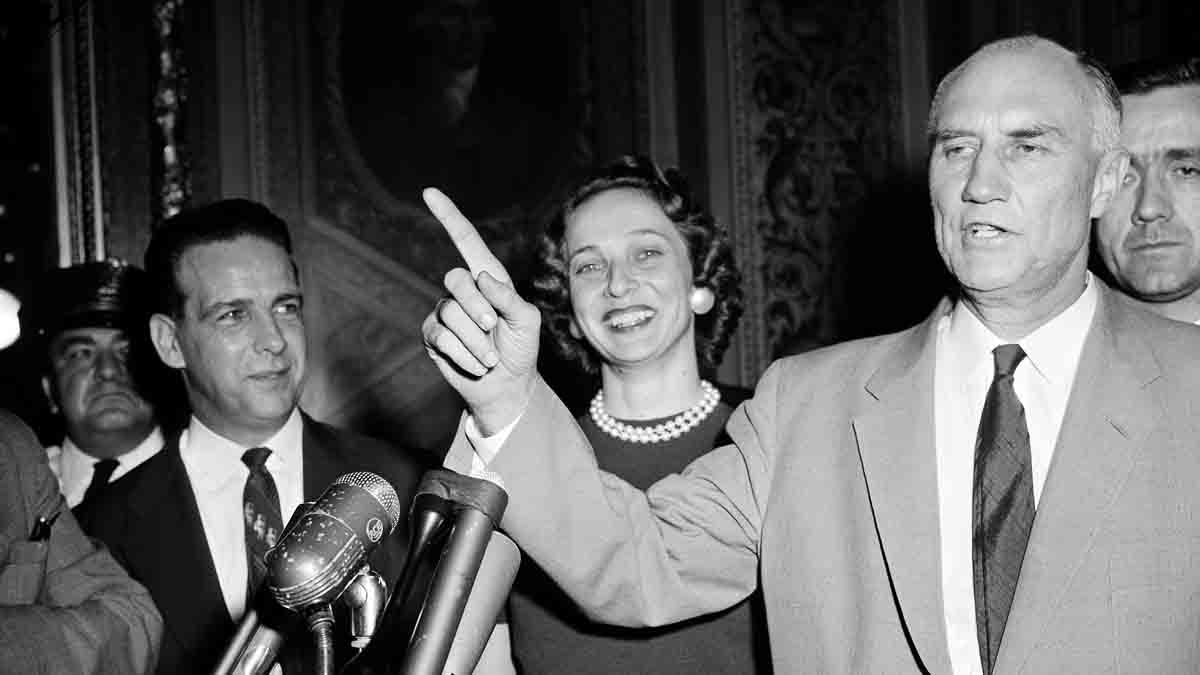
Even as Democrats celebrated the 100th judicial confirmation of Joe Biden's presidency, they are clamoring for more — and some are flirting with ending a century-long Senate practice to help make it happen.
The rising friction over what in Washington parlance is known as the “blue slip” is creating tensions on the Senate panel that handles judicial nominations and prompting stern warnings from Republicans about a dangerous escalation in the partisanship that already dominates the judicial confirmation process.
The clash over Senate procedure could have major ramifications for Biden as he seeks to fill as many court vacancies as possible during the final two years of his term. Aghast at the speed with which Republicans approved judges during the Trump era, Democrats have made the confirmation to the courts a top priority, vowing to fill every seat possible. Their focus on the nominations is even greater now that Republicans control the House and can stall much of Biden's broader legislative agenda.
WHAT IS THE 'BLUE SLIP'?
Get New England news, weather forecasts and entertainment stories to your inbox. Sign up for NECN newsletters.
Since at least 1917, the chairman of the Senate Judiciary Committee has sent a blue-colored form, or “blue slip," to the senators representing the home state of a judicial nominee. A blue slip returned with a positive response signals the senator's approval of moving forward with a nomination hearing. But if the blue slip is not returned or comes back with a negative response, that means the home state senator objects, which can doom the nomination.
Republicans during Donald Trump's presidency determined the lack of a positive blue slip would not stop them from moving forward with considering appellate court nominees — and they did so 17 times. Democrats were livid, pointing out that Republicans blocked several of President Barack Obama's appellate nominees by declining to return a positive blue slip.
Now, Democrats are being encouraged to follow suit and do away with the blue slip when it comes to the district judges whose courts serve as the starting point for federal civil and criminal cases.
”In many respects, it is an archaic holdover from a different era,” said Sen. Richard Blumenthal, D-Conn. “I think we’re maybe reaching the point of deciding whether it will be continued.”
Advocates for doing away with the blue slip say fast action is critical if Democrats want to have the kind of success Trump had in year three of his presidency, when he secured more than 100 judicial confirmations out of 231. They believe Democrats can't afford to wait months on Republican senators to give their go-ahead for a nominee.
Besides, they argue, if Democrats don't do away with the blue slip now, Republicans will abolish it when they return to the majority.
“Democrats would be chumps to say, ‘Oh well, we're not going to do this because it's a tradition,'" said Russ Feingold, the former three-term Democratic senator from Wisconsin who now serves as president of the American Constitution Society. The group is a liberal counter to the conservative Federalist Society.
The New York Times editorial board also weighed in recently, saying it was “far past time" for the chairman of the Senate Judiciary Committee to end the blue slip practice.
The chairman, Sen. Dick Durbin, D-Ill., has clearly heard some of the concerns voiced by progressives. He has made it a point recently to emphasize how Democrats submitted 130 positive blue slips for district court nominees during the Trump presidency, but so far, Republicans have only done so about a dozen times.
That's essentially because Biden has been filling judicial vacancies of predominately Democratic-appointed judges in blue states. Soon, it will get harder. There are about 40 district court vacancies that will require a blue slip from at least one Republican senator. Many of those vacancies don’t have a nominee yet, and Durbin is clearly sending a signal to GOP senators to work expeditiously with the White House on submitting prospective nominees.
Durbin said he wants to continue with the blue slip tradition, but he's adding a caveat: that they aren't used for “discriminatory purposes" to block consideration of nominees based on race, gender or sexual orientation.
His comments have alarmed Republican senators. Sen. Lindsey Graham, R-S.C., said the blue slip courtesy is “very much at stake and at risk here." He also questioned how Durbin is going to discern the motivations of Republicans senators if they object to a nominee.
“The last thing left in this body that makes the Senate the Senate, in my view, and gives a senator a say about a consequential decision in their state that will last a lifetime is the blue slip process," Graham said. “So I would just hope we could agree, if possible, that no matter how frustrated we get, we're going to honor this system."
So far, only one Biden nominee for a district court has had their nomination derailed because a senator withheld a blue slip, William Pocan, nominated to the Eastern District of Wisconsin. Republican Sen. Ron Johnson withheld his blue slip, saying he had heard concerns from the Green Bay legal community that they needed a judge locally based and active in their community.
Sen. John Cornyn, R-Texas, said complaints about the blue slip are “orchestrated and contrived." He said that he and Sen. Ted Cruz, R-Texas, were asked by the White House to submit names for an appellate court vacancy within three weeks, which they did.
“And eight months later, the administration finally gets around to nominating somebody," Cornyn said. “We've got two district court vacancies where we have not been contacted at all by the White House counsel. So, most of the delay is because the administration has been slow in filling these nominees, these vacancies."
Cornyn likened the efforts to ending the blue slip to Democratic calls for ending the filibuster so that legislation would only need a simple majority to advance rather than 60 votes.
“They want to fully dismantle the Senate as an institution," he said.
Proponents of the blue slip say its most important feature is to encourage collaboration and compromise. Durbin said he provided eight positive blue slips after negotiating on nominees with the Trump White House. “I had to give a little. They did, too," he said.
But Feingold, who served 16 years on the Judiciary panel and 18 years in the Senate, said he believes presidents will continue to consult with senators on judicial openings even without the blue slip, because they need a lawmaker's votes on other priorities.
“You need to consult them anyway because if you try to jam somebody really bad down their throat, they are going to remember it," Feingold said.
Blumenthal said he will bring lessons learned from the Obama years to the debate, and he’s determined not to let Republicans block district judges through the blue slip process the way they did appellate court judges.
“The history is undeniable that Republicans succeeded in blocking many of the Obama nominees, and therefore held open judgeships, which they then filled with alacrity,” Blumenthal said. “We’re not going to let that happen again.”



